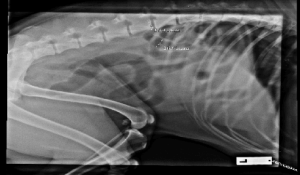Cronulla Veterinary Clinic provides treatment for bowel obstruction in dogs for pet owners in Sutherland Shire.
Dogs (and cats as well) can sometimes eat objects that cannot pass through the intestinal tract, and cause an obstruction. For example, one of our patients, a usually happy and food loving Labrador, recently came into the clinic very depressed and not wanting to eat, which was very unlike him.
He had a high temperature, and had a very painful tummy. He was admitted for intravenous fluids and supportive treatments, and screening x-rays were taken. The x-rays showed small intestinal bowel loops, distended with gas. As he usually is a master at sniffing out discarded food while on walks, we suspected he may have eaten something that was causing a blockage in his intestinal tract.


A second patient of ours, a young Cavalier, wasn’t so lucky after eating what turned out to be a peach pit. He had to have major abdominal surgery to have the peach pit removed.
Other discarded food items often found and eaten when just discarded instead of disposed of properly are cooked bones, kebab sticks (these can penetrate the intestinal tract and do a lot of damage), mango seeds, etc.
Non-food items can also be swallowed, such as toys, tennis balls, leather, sticks, pebbles and stones, plastic, string (these are extra risky as the string can cut through the intestinal wall – cats that play with wool and cotton are often at risk), etc.
When something is eaten by your dog, it usually takes up to 24 hours to pass through the digestive tract. If the object is too large, it can sometimes stay in the stomach for a longer time, even for months! But once it has reached the small intestines, and it is too big, it can get stuck and cause potentially life threatening problems.
Symptoms can include:
- Vomiting
- Abdominal pain, a “hunched up” look, and/or discomfort when being touched or picked up
- Lack of appetite
- No defecation
- Lethargy
These symptoms can make your vet suspect a foreign body, especially if you have seen your dog eat something unusual! But other problems (such as enteritis or pancreatitis or other diseases) may need to be ruled out as well. Most often, after a physical examination, bx-rays (possibly with contrast material) will be needed along with bloods and urine tests.
Other reasons for an intestinal blockage can be tumours, strictures, intussusceptions (where part of the bowel can get trapped inside itself), hernias, adhesions after abdominal surgery, or even heavy burdens of roundworm (often found in puppies).
Partial obstructions can cause intermittent vomiting and/or diarrhoea. Complete obstructions cause sudden abdominal pain, vomiting, and no passing of any gas or faeces.
Obstruction can cause the bowel area involved to have impaired blood supply, and the bowel tissue can become very unhealthy (necrotic), and may even burst, which is life threatening.
Prevention
Some dogs are more indiscriminate eaters than others. But always limit your dog’s access to food or food waste (e.g. no access to garbage bins, cupboards etc.) and make sure your dog has appropriate toys (the right size and made of material your dog can’t easily destroy and ingest). If feeding (raw) bones for mental and dental stimulation, if your dog is a bit of a ‘guts’ make sure the bone is large enough not to be finished quickly so you can let him have it for a few hours and then throw the remnants out.
It would also be much appreciated if everyone is more conscious about throwing leftover take away containers (especially if it contains leftovers such as corn cobs or kebab sticks) in a proper waste bin rather than discarding it out in the open, where dogs on their walks may find and swallow it before their owners are even aware of it.
If you are concerned that your pet has a bowel obstruction please contact Cronulla Vet Clinic.
